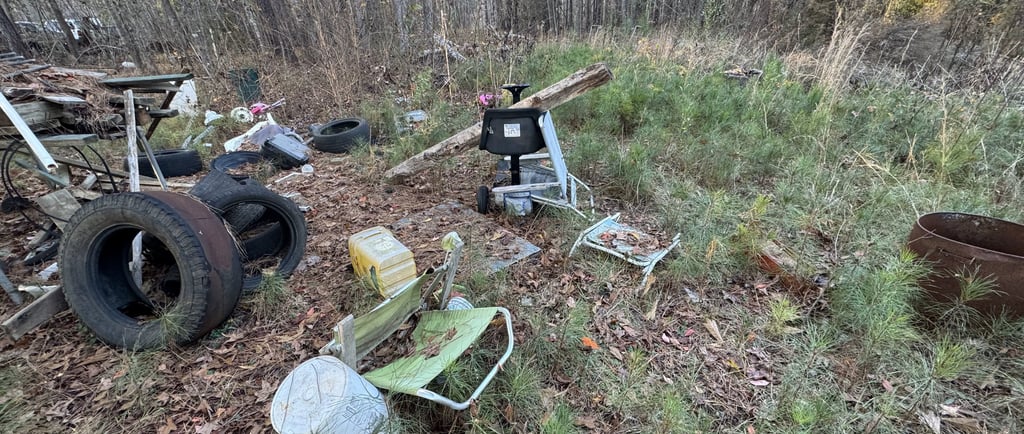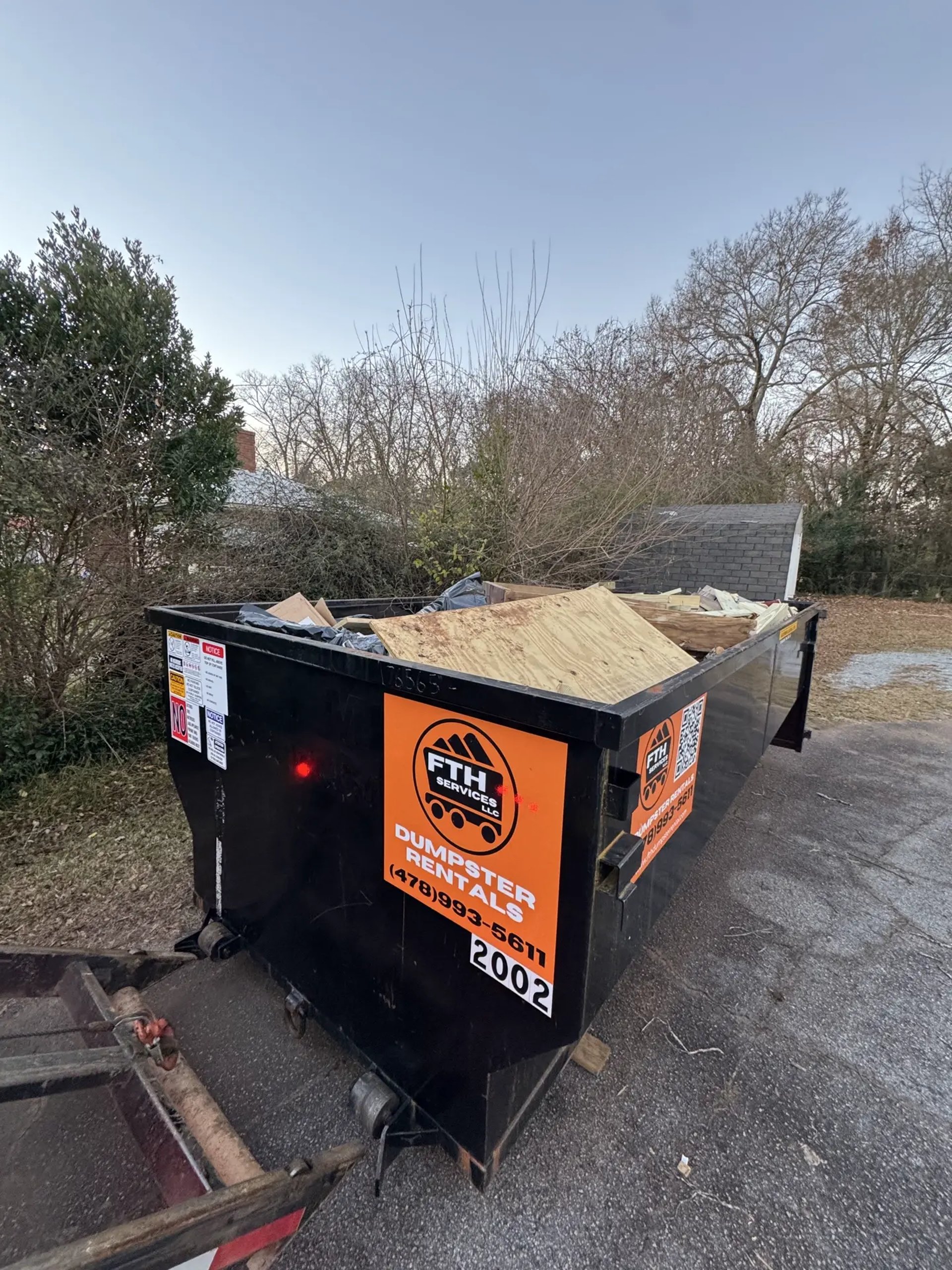Prohibited Items List: Safe Disposal of Tires, Wet Paint, and Concrete in Monroe County
Understand FTH Services' essential guide to disposing of prohibited items like tires, wet paint, and concrete. Learn the legal and safe recycling options specific to Monroe County, GA.
DUMPSTER BLOGS
Fred Hastings
11/5/20254 min read


Understanding Prohibited Items in Monroe County
In Monroe County, certain items are classified as prohibited due to their potential risks to public health and the environment. These items typically include hazardous substances that can cause contamination if not disposed of properly. The classification of prohibited items encompasses various categories such as electronic waste, chemicals, tires, wet paint, and concrete. Each item poses unique dangers; for instance, discarded tires can serve as breeding grounds for mosquitoes, while wet paint contains chemicals that can leach into the soil and waterways. Understanding these classifications can aid residents in making informed decisions about disposal methods.
The state and local regulations governing the disposal of prohibited items are designed to protect the community and the environment. Monroe County enforces strict laws that detail the correct procedures for disposing of these materials. Individuals who fail to adhere to these laws may face significant fines, which can serve as a deterrent against improper disposal practices. For example, fines for illegal dumping can be substantial, reflecting the seriousness of the offense and the potential environmental damage that can result from such actions.
Proper disposal methods not only ensure compliance with local regulations but also play a crucial role in promoting community safety. Engaging in responsible waste management practices, such as utilizing designated disposal sites for prohibited items, minimizes the risk of harming local ecosystems. Monroe County offers designated collection events and facilities for the disposal of hazardous items, making it easier for residents to dispose of their waste safely. Additionally, educating the public on the importance of adhering to these regulations fosters a culture of environmental stewardship among community members. As this awareness grows, the likelihood of harmful disposal practices diminishes, benefiting both residents and the natural environment alike.
Disposal Methods for Tires in Monroe County
The safe disposal of tires in Monroe County is guided by specific regulations and practices aimed at promoting environmental sustainability. Tires, when discarded improperly, can pose significant environmental hazards, including water pollution and the proliferation of breeding grounds for mosquitoes. Therefore, it is crucial to utilize designated recycling methods that adhere to local directives. Monroe County encourages residents to take advantage of tire recycling programs available in the area.
One primary location for tire recycling in Monroe County is the designated waste management facilities, which accept used tires year-round. These facilities are equipped to handle the diverse types of tires, including those from vehicles, bicycles, and small equipment. Moreover, the county regularly organizes special collection events, during which residents can bring their tires for recycling at no additional cost. Emphasizing the importance of these scheduled events assists in promoting community participation in recycling efforts.
Recycling tires serves multiple purposes beyond waste management. It helps in converting discarded tires into useful products such as rubber mulch, playground surfaces, and even fuel. This not only reduces landfill waste but also fosters economic opportunities through the creation of new products from recycled materials. Furthermore, by opting for tire recycling over traditional disposal methods, residents contribute positively to the environment, helping to mitigate the adverse effects of rubber pollution.
In summary, Monroe County provides various eco-friendly options for tire disposal, reinforcing the importance of participating in these initiatives. By selecting proper tire recycling methods and attending scheduled collection events, residents can ensure responsible waste management while protecting the environment for future generations.
Handling and Disposing of Wet Paint Safely
Proper disposal of wet paint is crucial to both environmental safety and public health. In Monroe County, residents should be aware that disposing of wet paint in regular trash is prohibited due to the potential hazards associated with its chemicals. To manage leftover paint responsibly, it is exemplary to first assess whether the paint is hazardous. This evaluation often involves reviewing the label; if the paint contains solvents such as turpentine or mineral spirits, it is considered hazardous waste.
Once you determine that you have leftover wet paint, the next step is to locate proper disposal resources. Monroe County provides various avenues for residents to dispose of hazardous materials safely. One key resource is the local disposal sites designated by the county, where residents can drop off their unused paints. These sites are equipped to handle hazardous waste, ensuring that harmful chemicals do not seep into the environment.
Additionally, paint exchange programs often occur throughout the year, allowing residents to donate unused paint that is still in usable condition. Such initiatives foster community sharing, helping others while reducing waste. Furthermore, Monroe County occasionally organizes special events focusing on household hazardous waste, where residents can bring their wet paint and other hazardous materials for safe disposal.
It is imperative to avoid pouring wet paint down drains or tossing it into landfills, as this can lead to contamination of water sources and soil. Safe disposal practices are essential in protecting both public health and the environment. By utilizing the available resources and following guidelines for hazardous waste disposal, residents can contribute positively to their community while ensuring that harmful substances are managed appropriately.
Concrete Disposal Options and Best Practices
Proper disposal of concrete is essential for ensuring compliance with local regulations and maintaining environmental integrity in Monroe County. Incorrect disposal methods, such as illegal dumping, can result in severe legal penalties and contribute to environmental degradation. Understanding the options available for concrete disposal can help residents make informed decisions.
Monroe County offers several drop-off sites where residents can responsibly dispose of concrete. These facilities are designed to accept concrete waste safely and efficiently. To find a relevant drop-off location, residents can consult the county's waste management website, which regularly updates information on site hours and accessibility. Additionally, certain recycling facilities specialize in processing concrete, transforming it into usable material for construction projects or landscaping. Utilizing these services not only benefits the environment but can also reduce disposal costs associated with traditional waste management methods.
Community initiatives have also emerged to repurpose concrete. These programs focus on reusing concrete for local projects, such as paths, garden beds, or erosion control. Residents can engage with these initiatives by contacting community organizations or participating in local events aimed at repurposing unused materials. Such involvement fosters community spirit while minimizing waste.
Before disposing of concrete, it is crucial to prepare it properly. This preparation may involve breaking down larger pieces to fit disposal criteria or removing contaminants such as metal and wood. Following these best practices ensures that disposal complies with Monroe County regulations while promoting sustainable waste management solutions. By understanding and utilizing the available disposal options, residents can contribute to a cleaner environment and avoid potential legal repercussions associated with improper concrete disposal.

© 2026 FTH Services LLC. All rights reserved
FTH Services
(Fully Insured)
722 Stokes Store Road
Forsyth Georgia 31029
Business Hours
Monday 7:00 AM - 7:00 PM
Tuesday 7:00 AM - 7:00 PM
Wednesday 7:00 AM - 7:00 PM
Thursday 7:00 AM - 7:00 PM
Friday 7:00 AM - 7:00 PM
Saturday 8:00 AM - 5:00 PM
Sunday Closed
